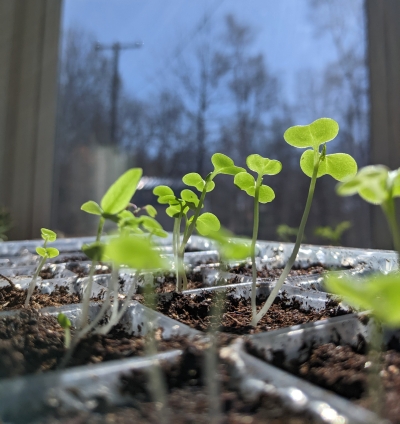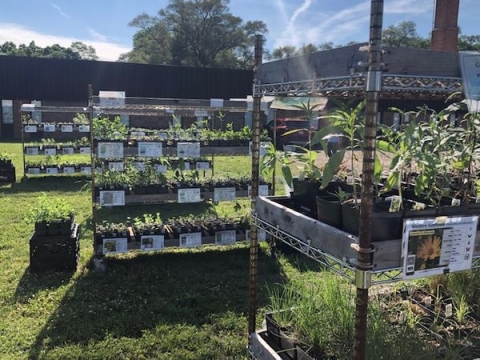
Spring is coming fast, and we can't wait for another sunny growing season in Michigan! While it may be a little too early to plant our vegetables and flowers, there are some things we can do to prepare for a successful growing season, and a few upcoming events at the Library to help you do so. Let's mark our calendars, check a few things off of our to-do lists, and get ready for our most fun and successful gardening seasons yet! Here are some gardening tips to help you prep for spring, along with our most exciting upcoming programs that are geared towards gardeners!
- Start your seeds. This is the perfect time of year to start vegetable, fruit, herb, and flower seeds for the garden. Some plants, like tomatoes and peppers, are best started in late February or early March-- but zinnias, cosmos, melon, cucumber, basil, parsley, and so many other seeds can be started anywhere from four to eight weeks before our last frost date! If you're unsure when to start your seeds, be sure to check the back of the seed packet for more information. Or, join us on Saturday, April 5 @ 11:00 am for Cromaine's annual Spring Seed Swap to chat with other local gardeners about your seeds! You might just walk away with some fun new seed varieties to try, too.
Consider planting native! Native plant varieties are amazing little warriors in our gardens. They can help resist pests and disease, aerate the soil, mine hard-to-reach nutrients from deep underground, and support a variety of birds, bees, butterflies, moths, and other pollinators that non-native plants often do not. Not sure what to buy? Peruse the pre-sale order form for the Hartland Home and Garden Club's Native Plant Sale on Saturday, June 14! The order form lists tons of beautiful native flowers, forbs, and grasses, and also lists important information, like their sun and moisture requirements, so you can decide which native species are best for your landscape. We hope to see you at the plant sale!

- Sketch out your garden plans. Having a draft of what you want your garden to look like can save you time and stress when the weather is warm and it's time to plant! A garden plan can be as detailed or as vague as you want, as long as it helps you when planting time comes. Some gardeners sketch out exactly where they would like every plant to go, while others draw up simple charts of companion plants and good plant pairings, so they don't have to worry about forgetting anything when they're working in the garden. Looking for ideas? Join us on Tuesday, April 8 @ 6:00 pm to learn from author and gardener Janet Macunovich! In her Improving the Older Garden lecture, presented by the Hartland Home and Garden Club, she'll suggest great ways to improve the established garden by overcoming common obstacles, visualizing change, and selecting new plants.
- Gather and clean your tools. It can be frustrating to start a gorgeous, sunny day in the garden, only to discover that you can’t find your tools– or worse, that your tools are rusty, dirty, or damaged! Take the time now to gather, organize, and clean your gardening spades, shovels, pots, and other tools to avoid frustration later. You’ll be glad that you did! Not only does this make gardening easier come spring– it can also prevent any fungal or bacterial diseases from last year's plants being spread to this year’s.
Consider composting! Healthy soil is the foundation of a healthy garden, so it's important to consider what we are growing our plants in if we want a garden with healthy growth and resistance to common diseases. Making your own compost not only enriches your garden with the best fuel you can possibly provide it with-- it also helps to reduce kitchen and yard waste! There are many ways to compost, and whichever way you choose to do it can help keep your garden thriving. Learn the basics of composting, and other soil remedies, here.
- Prepare for hungry herbivores. Critters like squirrels, groundhogs, deer, and raccoons can wreak havoc on a garden. Make sure you are considering your methods of plant protection now to prevent stress later! Physical barriers, chemical barriers, and other deterrents can help protect the garden. Physical barriers are often fencing, such as chicken wire, fishing wire, or a privacy fence. Chemical barriers often use an animal's sense of smell to deter them from your garden, and can include products like Liquid Fence or Plantskydd, both of which are considered safe for organic gardening. Other deterrents might include companion planting, letting the dog roam the garden regularly, and other preventative measures to discourage herbivory. There are lots of methods out there to help protect your plants, so make sure you have a plan in place to keep your garden thriving!
- Try to resist spring cleanup until consistently warm weather arrives. It's tempting to grab a rake and clean up those old plants, leaves, and other garden waste now, but try to wait until later in the season-- there are many pollinators sleeping in that plant material! Our friend Brian, founder of local non-profit Bees in the D, suggests waiting to clean up plant debris until we've had about a week of 50 degree (Fahrenheit) weather at night. By this time, native bees have usually emerged from hollow stems, leaf litter, and other cozy spots in plant debris, and we can clean up our yards without harming pollinators. Learn more about Bees in the D, as well as fun facts that we learned about bees when Brian visited the Library last month, here!
We may be dreaming of long afternoons in our sunny gardens, trimming flowers and picking vegetables, but there's plenty to do for our garden while we wait for the weather to warm. Please join us at our upcoming garden-focused programs, and see the online calendar for more information about what's happening at your library! We can't wait for summer to arrive, but it's also looking to be a beautiful and busy spring.